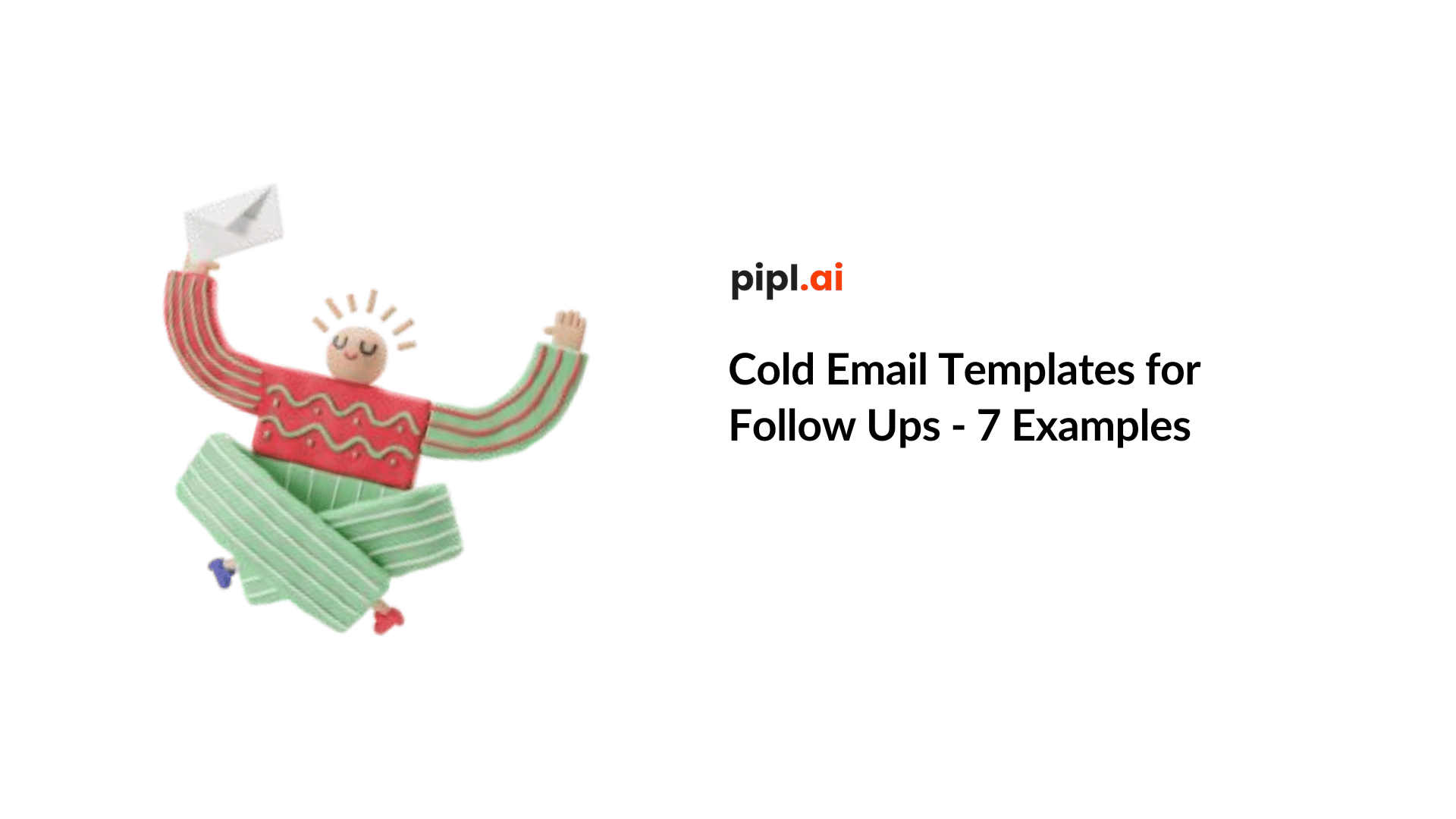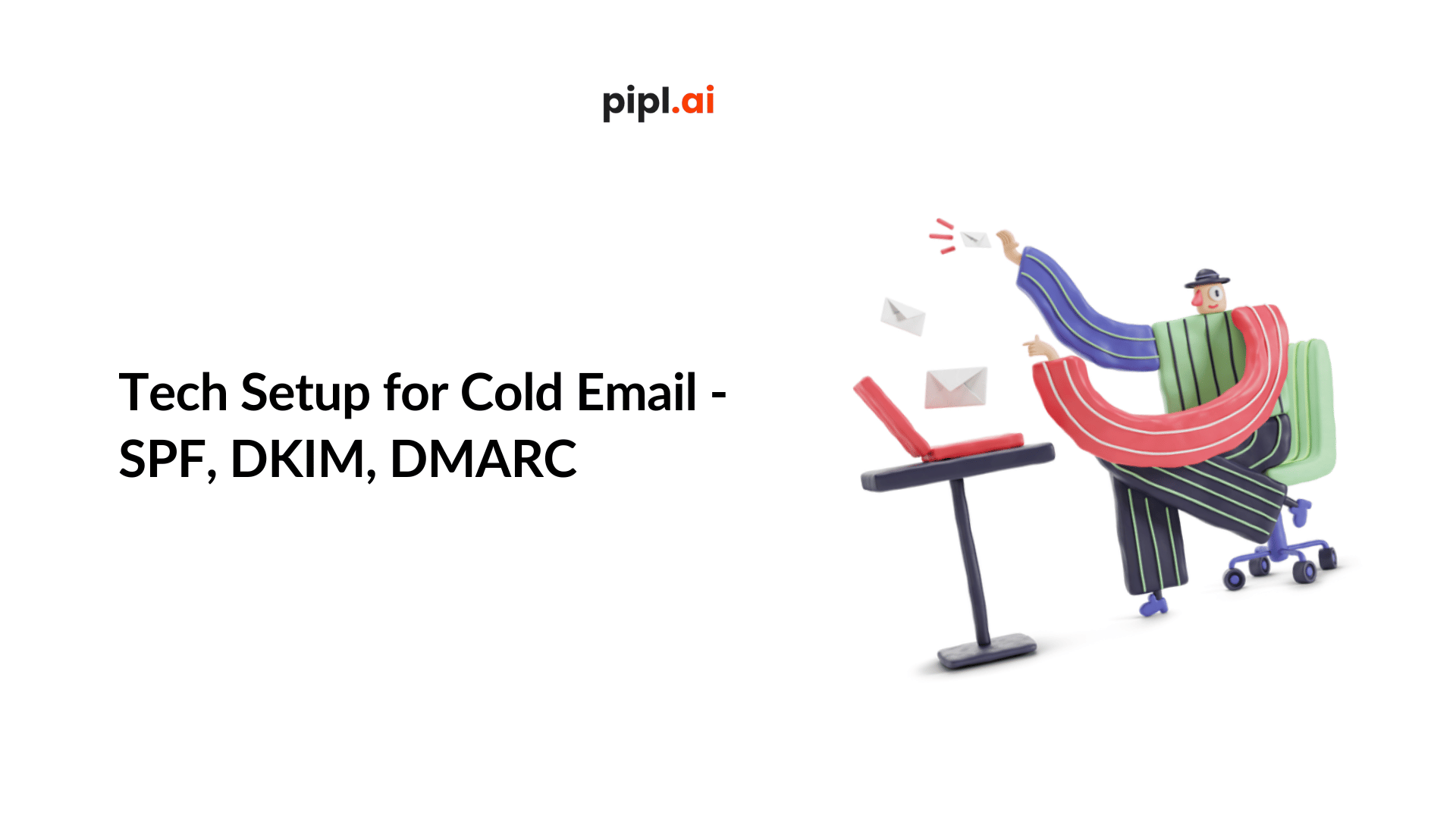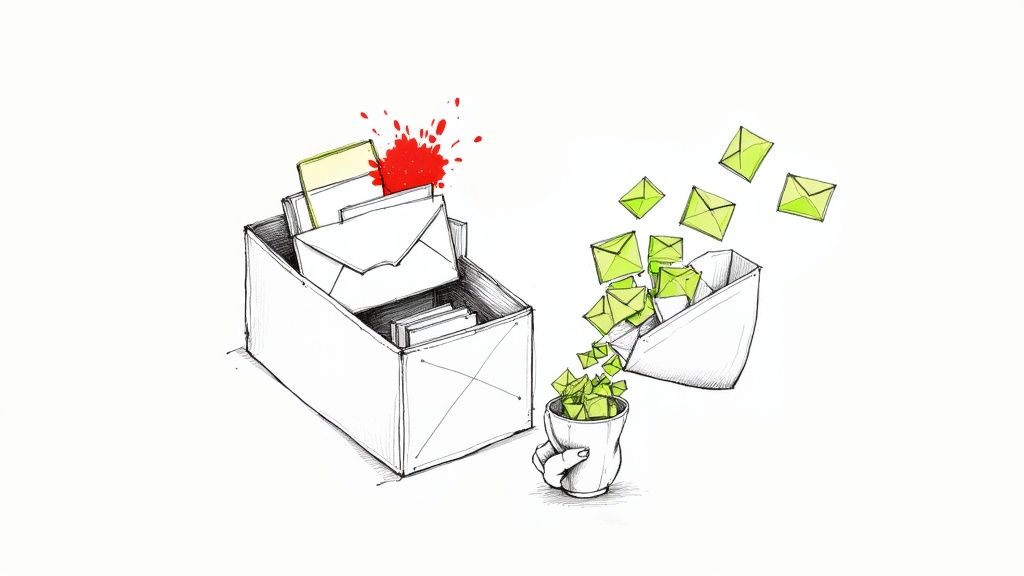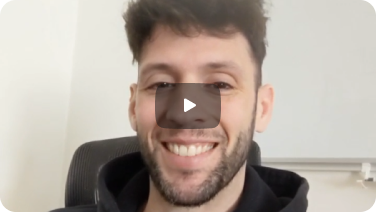Unlocking Hidden Opportunities: The Power of the Job Inquiry Email
Want to uncover unadvertised jobs and connect directly with hiring managers? This listicle provides six job inquiry email examples to boost your job search. Learn how to write compelling emails for various scenarios, including general inquiries, referrals, post-networking follow-ups, cold outreach, industry transitions, and recent graduate applications. From crafting a targeted subject line to showcasing your skills, these job inquiry email examples will help you make a strong first impression and land interviews. We'll also explore how PlusVibe can enhance your outreach.
1. General Position Inquiry Email
A General Position Inquiry Email, also known as a prospecting email or a letter of interest, is a proactive approach to job searching where you reach out to companies you admire, even if they aren't actively advertising open positions. This method allows you to express genuine interest in a company's culture, values, and mission, while simultaneously inquiring about potential opportunities that might not be publicly listed. It's a powerful tool for demonstrating initiative and building connections, especially in competitive job markets. This type of job inquiry email example focuses on expressing your passion for the organization and aligning your skills with their overall mission.

This approach works by showcasing your proactive nature and genuine interest. Instead of simply reacting to available job postings, you're taking the initiative to connect with companies you genuinely want to work for. By tailoring your email to each company's specific needs and values, you demonstrate that you've done your research and aren't just sending out mass, generic inquiries. This personalized touch can help you stand out and make a strong first impression. Learn more about General Position Inquiry Email
Successful implementation of this strategy requires careful research and personalization. For example, a tech professional reaching out to a startup might highlight their experience with agile development methodologies and their passion for innovative technology, referencing a recent product launch or press release from the company. Similarly, a recent graduate contacting companies in their field could emphasize relevant coursework, internships, or volunteer experiences that align with the company's mission and values. Career changers exploring new industries can leverage transferable skills and express their enthusiasm for learning and contributing to the new field.
Here are some actionable tips to craft effective general position inquiry emails:
- Thorough Company Research: Understand the company's mission, values, recent projects, and leadership. Use this information to personalize your email and demonstrate genuine interest.
- Identify a Contact Person: Addressing your email to a specific person, such as a hiring manager or team lead, significantly increases your chances of being noticed. Use LinkedIn or the company website to find the appropriate contact.
- Compelling Subject Line: A concise and engaging subject line is crucial for grabbing attention. Examples include: “Enthusiastic [Your Profession] Interested in [Company Name],” or “Following [Company Name]'s Work in [Industry].”
- Concise and Focused Content: Keep your email brief and to the point (under 200 words). Clearly state your purpose, highlight relevant skills and experience, and express your enthusiasm for the company.
- Call to Action: End with a clear call to action, such as requesting an informational interview or expressing your willingness to learn more about potential opportunities.
- Professional Tone and Enthusiasm: Maintain a professional tone while conveying your genuine excitement about the company and its work.
The advantages of using this job inquiry email example are significant. It showcases a proactive approach to job searching, often uncovering hidden job opportunities that aren't publicly advertised. It allows you to demonstrate genuine interest in a company, which can be a differentiating factor in a competitive job market. Finally, it often means facing less competition compared to applying for advertised positions. However, it's important to be aware of the potential downsides. General position inquiry emails typically have a lower response rate than applications for specific openings. They can also be perceived as generic if not well-researched and personalized, requiring extensive company research for each email.
Crafting a compelling job inquiry email is just the first step. To further enhance your application and increase your chances of landing an interview, consider these helpful tips for writing a job application from Bewerbung schreiben Tipps: 10 Schritte zum Erfolg by Headyshot. They offer further valuable insights into optimizing your application materials.
This method is particularly valuable for small business owners, digital marketing professionals, sales teams, cold outreach specialists, email marketing agencies, lead generation agencies, and go-to-market teams who are looking to expand their networks and discover new opportunities. By demonstrating initiative and genuine interest, the general position inquiry email can be a powerful tool for connecting with target companies and unlocking hidden career pathways.
2. Referral-Based Job Inquiry Email
A referral-based job inquiry email is a powerful tool in your job search arsenal. It leverages the strength of a mutual connection to introduce you to a potential employer, offering a significant advantage over traditional cold applications. This approach carries more weight because it comes with an implied recommendation from someone the recipient already knows and trusts. This trust factor can significantly increase your chances of getting your foot in the door and securing an interview. For small business owners, digital marketing professionals, sales teams, cold outreach specialists, email marketing agencies, lead generation agencies, and go-to-market teams, building and leveraging a network is crucial, and referral-based inquiries can be a game-changer.

This method works by establishing a warm introduction instead of a cold one. By mentioning your mutual connection upfront, you immediately capture the recipient's attention and create a sense of familiarity. The email should clearly state the context of your relationship with the referrer, your interest in a specific role or department within the company, and how your professional background aligns with the organization's needs. The ultimate goal of the email is to secure an informational interview or a more formal meeting, paving the way for potential employment opportunities.
The benefits of this approach are numerous. Referral-based job inquiry emails generally boast higher response rates compared to standard applications due to the inherent personal connection. They build immediate trust and credibility, often leading to informational interviews that can provide valuable insights into the company culture and open positions. Furthermore, this method can sometimes bypass traditional application processes, offering a fast track to the hiring manager. Imagine a scenario where a sales team lead is looking for a new role. A referral from a respected figure in the industry could be the key to landing an interview at a highly competitive company.
Here are some examples of how referral-based introductions can occur: A LinkedIn connection introduces you to one of their colleagues, an alumni network facilitates a referral to a company known for hiring graduates from your program, a professional association member recommends you to a hiring manager within their network, or a former colleague puts you in touch with their current employer. These scenarios illustrate the diverse ways in which existing networks can open doors to new opportunities.
However, this approach also has its drawbacks. It requires cultivating and maintaining a strong professional network. Not everyone has a vast network to draw upon, particularly those starting their careers. Furthermore, using a referral may put some pressure on the referrer, especially if they don’t know you well or aren’t comfortable vouching for your skills. Finally, this option isn't always available, making it important to have other job search strategies in place.
To effectively utilize this method, follow these tips: Always seek permission from your referrer before mentioning their name in your email. Clearly explain how you know the referrer and the context of your relationship. Avoid overselling the relationship if it's casual; honesty and authenticity are crucial. Always thank both the referrer and the recipient for their time and consideration. Finally, be specific about the role or type of opportunity you're seeking. This clarity demonstrates your seriousness and helps the recipient understand how they can assist you.
For instance, instead of just saying you're looking for a "job," specify your interest in "a marketing role focusing on content creation." This specificity makes it easier for both the referrer and the recipient to assess your suitability for potential openings. For those looking to improve their networking and referral skills, Learn more about Referral-Based Job Inquiry Email. By understanding the nuances of referral-based job inquiry emails and following these best practices, you can significantly improve your job search outcomes and land your dream role. This technique is particularly valuable for job inquiry email examples as it showcases the power of personalized connections in the professional world.
3. Follow-Up After Networking Event Email
A crucial aspect of successful networking is the follow-up. A well-crafted follow-up email after a networking event, job fair, or professional gathering can significantly increase your chances of landing a job opportunity or building a valuable professional connection. This type of job inquiry email example focuses on nurturing a nascent relationship by reigniting the conversation and exploring potential synergies while the initial interaction is still fresh in both your minds and the mind of your contact. This proactive approach demonstrates your genuine interest and keeps you top-of-mind for opportunities that might arise.

This method works by leveraging the established face-to-face connection. Unlike cold outreach, where you're reaching out to a complete stranger, a post-networking event email builds upon a pre-existing interaction. This provides a natural context for your communication and makes your message more likely to be well-received. You're not starting from scratch; you're continuing a conversation. This is especially valuable in today's competitive job market and fast-paced business environment. A timely and relevant follow-up can distinguish you from other attendees who may also be vying for the same opportunities. This job inquiry email example allows you to reinforce your professional background and skills in a context relevant to the recipient's interests, as discussed during your initial meeting.
Here are a few examples of successful implementations of this job inquiry email example:
- After a job fair booth conversation: You met a recruiter at a job fair and discussed your interest in a specific role. A follow-up email allows you to reiterate your interest, highlight relevant skills, and attach your resume for their review.
- Following an industry conference networking session: You connected with a senior leader in your field at a conference. A follow-up email can express your appreciation for their insights, mention a specific point of discussion, and suggest a virtual coffee chat to continue the conversation.
- Post a professional meetup encounter: You met several professionals in your industry at a meetup. A follow-up email can help you stay connected with these individuals, share relevant resources, and potentially explore collaboration opportunities.
- After attending a company open house: You attended a company open house and spoke with team members. Following up allows you to express your continued interest in the company and ask specific questions that arose after the event.
To maximize the effectiveness of your follow-up email, consider these actionable tips:
- Timeliness is Key: Send your email within 24-48 hours of the meeting, while the interaction is still fresh in both your minds.
- Personalize Your Message: Refer to specific conversation points to demonstrate your attentiveness and recall details that resonated with you.
- Provide Value: Attach a scan of your business card or a link to your LinkedIn profile for easy access to your information.
- Suggest Concrete Next Steps: Propose a specific call to action, such as a brief phone call or a virtual meeting to discuss potential opportunities further.
- Maintain Consistency: Keep the tone of your email consistent with your in-person interaction. If the conversation was formal, maintain a professional tone. If it was more casual, you can adopt a slightly less formal approach.
While this method offers significant advantages, it's important to be aware of its limitations. It requires a good memory of the conversation details to personalize your message effectively. You’ll also be competing with other attendees who are likely sending follow-up emails as well. Furthermore, this approach is limited to people you've actually met, so it won't help you expand your network to entirely new contacts.
The benefits of using a follow-up after networking event email are numerous. It builds on an existing connection, shows professionalism, and keeps you top-of-mind for potential opportunities. This approach offers a natural continuation of the conversation and can be a powerful tool for career advancement and professional development. This job inquiry email example is widely popularized by career counselors, networking coaches, and professional development experts as a best practice for building and maintaining professional relationships.
For further guidance on handling follow-up emails, particularly when you haven't received a response, Learn more about Follow-Up After Networking Event Email. This resource offers valuable insights into crafting effective follow-up strategies. Using this job inquiry email example effectively can significantly enhance your networking efforts and open doors to new opportunities.
4. Cold Outreach to Hiring Manager Email
A Cold Outreach to Hiring Manager Email is a direct approach to job searching where you contact the hiring manager or department head directly, bypassing the traditional HR channels. This proactive strategy allows you to connect with the decision-maker who best understands the specific role requirements, team dynamics, and current challenges the team faces. It’s a powerful tool in your job inquiry email example arsenal, offering a potential fast-track to your dream job.
This method works by identifying the relevant hiring manager for the specific team or department you’re interested in and crafting a personalized email that demonstrates your understanding of their work and how your skills align with their needs. Instead of simply submitting your resume through an online portal, you take the initiative to introduce yourself and your value proposition directly to the person who has the power to hire you. This demonstrates initiative, research skills, and genuine interest in the specific team and role. It shows you're not just sending out generic job inquiry email examples, but a targeted message crafted for a specific opportunity.
For instance, imagine a software developer contacting the engineering manager directly about a specific project they’ve been following, highlighting their relevant experience with similar technologies. Or a marketing professional reaching out to the CMO about a recent campaign they admired, suggesting innovative ideas to improve upon it. Sales candidates can contact sales directors about specific market opportunities they’ve identified. These examples showcase how targeted cold outreach can open doors that might otherwise remain closed.
However, this approach is not without its risks. One of the main drawbacks is the possibility of being perceived as circumventing established HR processes. Some companies prefer candidates to follow the standard application procedure, and a direct approach might be seen as aggressive or disrespectful. It also requires diligent research to identify the correct contact person and understand their team’s current needs and challenges.
Pros and Cons of Cold Outreach to Hiring Manager Emails:
Pros:
- Direct access to decision-makers
- Bypasses crowded HR channels
- Shows initiative and research skills
- Can create immediate opportunities
Cons:
- May be seen as circumventing proper channels
- Requires extensive research to find the right person
- Risk of appearing too aggressive
Tips for Successful Cold Outreach:
- Thorough Research: Research the hiring manager’s background, experience, and current projects. LinkedIn is a valuable resource for this.
- Targeted Approach: Demonstrate your knowledge of the team's recent projects and specific challenges. This shows you've done your homework and are genuinely interested.
- Brevity and Focus: Keep the initial email concise and focused on the value you bring. Avoid lengthy introductions or generic statements.
- Value Proposition: Clearly articulate the specific skills and experience you offer and how they align with the team's needs. Quantify your achievements whenever possible.
- Professional Tone: Maintain a professional yet personable tone. Avoid being overly familiar or demanding.
The following infographic illustrates the three key steps in crafting an effective Cold Outreach to Hiring Manager Email.

This infographic outlines a streamlined, three-step process for successful cold outreach: research, personalization, and highlighting your value proposition. This structured approach ensures your email is targeted, relevant, and impactful, maximizing your chances of getting a response.
When to use this approach depends on your industry, the company culture, and your comfort level with direct communication. It can be particularly effective in fast-paced industries like tech and startups where hiring managers are often actively seeking talent. Learn more about Cold Outreach to Hiring Manager Email by checking out this article: Learn more about Cold Outreach to Hiring Manager Email
This method deserves its place in the list of job inquiry email examples because it offers a unique blend of directness and personalization. While it requires more effort than simply applying through traditional channels, the potential rewards – direct access to decision-makers and a faster hiring process – can make it a worthwhile strategy for the right candidate.
5. Industry Transition Job Inquiry Email
Changing careers can be a daunting task, especially when moving into a completely new industry. A well-crafted job inquiry email can be your key to unlocking new opportunities and showcasing your value despite a seemingly unrelated background. This specific type of job inquiry email, the "Industry Transition Job Inquiry Email," is designed to bridge the gap between your previous experience and your desired new field. It allows you to address potential employer concerns head-on while highlighting your transferable skills and demonstrable commitment to this new career path. This method is crucial for anyone seeking a job inquiry email example that goes beyond the standard template and speaks directly to the challenges and opportunities of an industry transition.
This approach works by strategically positioning you, not as a novice, but as a valuable asset with a unique perspective. It acknowledges the shift in your career trajectory while simultaneously emphasizing how your existing skills and experiences translate to the new industry. Instead of focusing on what you lack in terms of direct experience, this email focuses on what you bring to the table: adaptability, a fresh perspective, and a proven track record of success in another field. This is particularly important for target audiences such as small business owners, digital marketing professionals, sales teams, cold outreach specialists, email marketing agencies, lead generation agencies, and go-to-market teams, who often value innovative thinking and diverse skillsets.
Here's how the key features work in tandem:
- Clear explanation of career transition motivation: Clearly articulate why you're making the change. What sparked your interest in this new industry? What are your long-term goals? Authenticity is key here.
- Transferable skills highlighting: Identify skills from your previous roles that are directly applicable to the target position. This might include project management, communication, leadership, analytical skills, or technical proficiencies. Quantify your accomplishments whenever possible.
- Industry knowledge demonstration: Showcase your research. Mention relevant industry trends, challenges, or key players. This demonstrates your genuine interest and commitment to learning.
- Passion and commitment expression: Express your enthusiasm for the new industry and the specific company you're contacting. Why are you excited about this opportunity?
- Learning willingness and adaptability emphasis: Acknowledge that there will be a learning curve but emphasize your eagerness to learn and adapt quickly. This proactively addresses concerns about your lack of direct experience.
Consider these successful implementation examples:
- Military veteran transitioning to a corporate role: A veteran might highlight their leadership experience, strategic thinking, and ability to perform under pressure, skills highly valued in corporate settings.
- Teacher moving into corporate training: A teacher can showcase their communication skills, instructional design experience, and ability to manage diverse groups, all relevant to corporate training roles.
- Retail manager entering project management: A retail manager might emphasize their experience in inventory management, scheduling, team leadership, and problem-solving, which are transferable to project management.
- Finance professional moving to a tech company: A finance professional could highlight their analytical skills, data interpretation abilities, and financial modeling expertise, all valuable assets in the tech industry.
To craft an effective Industry Transition Job Inquiry Email, follow these actionable tips:
- Research thoroughly: Deep dive into the industry's terminology, trends, and key players. This will enable you to speak the language and demonstrate your genuine interest.
- Highlight relevant certifications/courses: If you've taken any courses or earned certifications related to the new industry, highlight them to showcase your proactive approach to skill development.
- Show long-term commitment: Express your intention to build a long-term career in this new field. This allays concerns about your commitment to the transition.
- Address experience gaps: Acknowledge any potential gaps in your experience and explain how you plan to address them through continuous learning and development.
- Emphasize your fresh perspective: Frame your diverse background as an advantage. Highlight how your unique perspective can bring fresh ideas and innovative solutions to the table.
While this approach offers many advantages, including proactively addressing transition concerns, demonstrating serious commitment, and highlighting a unique perspective, it also has potential drawbacks. You may face skepticism about your commitment, and you'll need to invest significant time in industry research. You'll also be competing with candidates who have direct industry experience. However, by carefully crafting your job inquiry email and highlighting your transferable skills and genuine enthusiasm, you can effectively overcome these challenges and make a compelling case for your candidacy. This specialized job inquiry email example is a powerful tool for anyone looking to make a successful career transition.
6. Recent Graduate Entry-Level Inquiry Email
For recent graduates or those just starting their careers, the job hunt can feel like an uphill battle. Limited practical experience can make it challenging to stand out against more seasoned applicants. This is where the recent graduate entry-level inquiry email comes into its own. It offers a way to showcase your potential, enthusiasm, and relevant academic background to prospective employers. This type of job inquiry email example is specifically tailored to highlight the strengths of a recent graduate and compensate for the lack of a lengthy work history. It’s a proactive approach that can open doors to opportunities that might otherwise be missed.
This method works by focusing on what you do have: a strong educational foundation, relevant coursework, project experience, internships, and a burning desire to learn and contribute. Rather than simply listing your (limited) work history, a recent graduate entry-level inquiry email emphasizes your academic achievements, relevant skills, and the alignment of your career goals with the company’s mission. It allows you to demonstrate your potential and showcase the value you can bring to the table, even without years of on-the-job experience.
Features of an Effective Recent Graduate Entry-Level Inquiry Email:
- Emphasis on Educational Background and Achievements: Mention your degree, major, GPA (if high), relevant coursework, and any academic awards or recognitions.
- Highlighting Internship and Project Experience: Detail any internships, part-time jobs, volunteer work, or academic projects that demonstrate relevant skills. Quantify your achievements whenever possible.
- Expressing Enthusiasm and Eagerness to Learn: Let your passion for the industry and your eagerness to contribute shine through. Your enthusiasm can be a major differentiator.
- Mentioning Relevant Coursework and Skills: Connect your academic learning to the requirements of the target role, highlighting specific software, technical skills, or knowledge gained through your studies.
- Aligning Career Goals and Interests: Demonstrate that you’ve researched the company and understand its mission. Explain how your career aspirations align with their values and how you envision contributing to their success.
Examples of Successful Implementation:
- A computer science graduate reaching out to a tech startup, highlighting their capstone project that involved developing a similar software application.
- A business major contacting a consulting firm, emphasizing their internship experience in market analysis and their strong analytical skills developed through coursework.
- A communications student approaching a marketing agency, showcasing their work on university publications and their understanding of digital marketing trends.
- An engineering graduate inquiring at a manufacturing company, detailing their relevant coursework in CAD software and their passion for process improvement.
Actionable Tips for Crafting a Powerful Inquiry Email:
- Emphasize academic projects and internships: These experiences often provide valuable practical skills and demonstrate your ability to apply theoretical knowledge.
- Show knowledge of current industry trends: Demonstrate that you're up-to-date with the latest developments and challenges in the field.
- Highlight relevant extracurricular activities: These activities can showcase leadership skills, teamwork, and other valuable soft skills.
- Demonstrate specific software or technical skills: If the role requires specific software or technical proficiency, be sure to mention your experience and skills in these areas.
- Express willingness to start in various roles: Showing flexibility can increase your chances of getting your foot in the door.
Pros and Cons of the Recent Graduate Entry-Level Inquiry Email:
Pros:
- Shows enthusiasm and a fresh perspective.
- Highlights potential rather than just experience.
- Demonstrates current knowledge and recent training.
- Often viewed favorably for cultural fit.
Cons:
- Limited work experience to showcase.
- May be perceived as lacking practical skills.
- High competition with other new graduates.
When and Why to Use This Approach:
This approach is ideal when you're a recent graduate or entry-level candidate with limited work experience but possess a strong academic background and relevant skills. It’s particularly effective for targeting companies known for their internship programs or their willingness to invest in developing young talent. This job inquiry email example is a proactive way to network, express your interest in a specific company or role, and potentially uncover hidden opportunities. It's also a valuable tool for showcasing your passion, drive, and potential, making you a more compelling candidate even in a competitive job market.
Learn more about Recent Graduate Entry-Level Inquiry Email
For small business owners, digital marketing professionals, sales teams, cold outreach specialists, email marketing agencies, lead generation agencies, and go-to-market teams, understanding the nuances of crafting effective outreach, like this specific job inquiry email example, is crucial. It can significantly impact your ability to attract and nurture top talent. By understanding how recent graduates leverage these emails to present their value proposition, these professionals can also improve their own outreach strategies and better identify promising candidates.
6 Job Inquiry Email Types Comparison
Supercharge Your Outreach with PlusVibe
This article has provided you with six distinct job inquiry email examples, covering scenarios from general inquiries to industry transitions and recent graduate applications. Mastering these templates and tailoring them to your unique situation is crucial for making a strong first impression and landing an interview. Remember the key takeaways: personalize each email, highlight relevant skills, and always follow up. These seemingly small steps can significantly impact your job search success, opening doors to exciting new opportunities and career growth.
For small business owners, digital marketing professionals, sales teams, cold outreach specialists, email marketing and lead generation agencies, and go-to-market teams, effective communication is paramount. In the competitive job market, leveraging every advantage is essential. That's where PlusVibe comes in. PlusVibe uses the power of AI to personalize your job inquiry emails at scale, optimizing for deliverability and engagement, so you can focus on what matters most: showcasing your talent.
Ready to transform your job search and experience the future of outreach? PlusVibe can help you personalize and scale your job inquiry emails based on the examples provided, maximizing your chances of getting noticed. Visit PlusVibe today and discover how AI can help you land your dream job.














































.jpeg)





























































